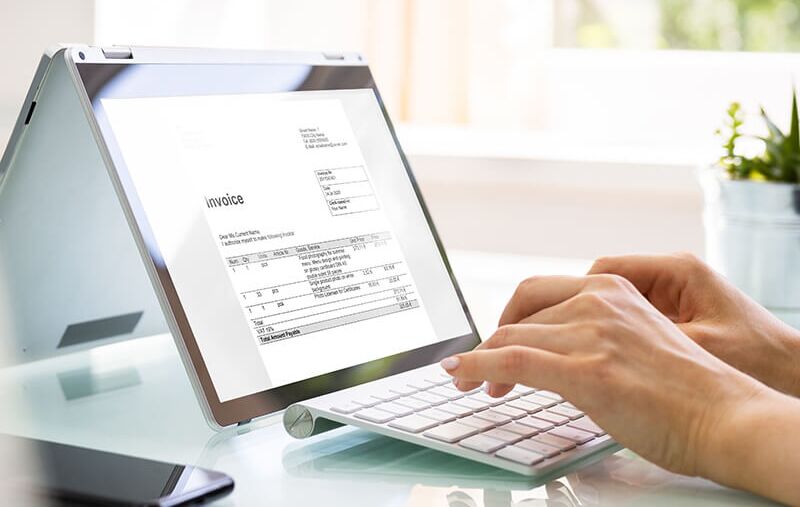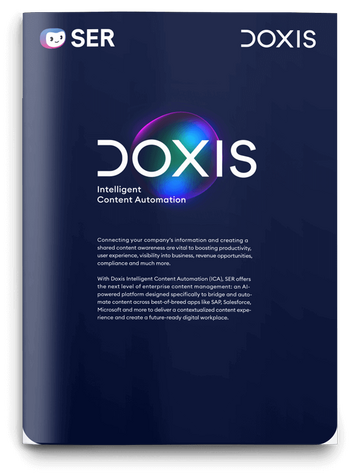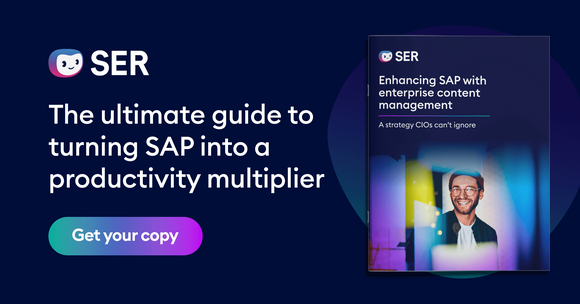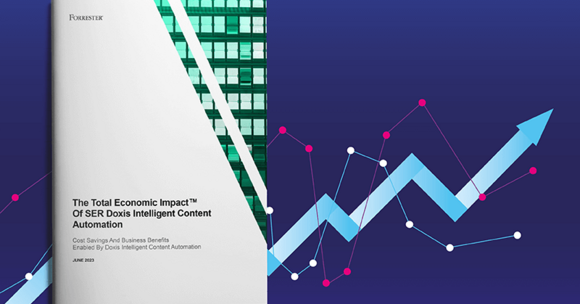SER Blog Customer Stories & Use Cases
A smarter way to handle eInvoices: Your 6-step automation guide
The eInvoicing mandate is here! Since January 1st, 2025 companies have been grappling with the requirement to be able to receive invoices electronically. Now is exactly the time to think about how to unlock maximum efficiency for your accounting processes. And where better to do that than as part of the digital strategy? For most, the answer lies in automation. If you consider that more than 90% of transactions repeat themselves over and over, the potential savings are huge. Transform your accounting with our 6-step guide to full-scale accounting automation — even posting.

Why is accounting automation important?
Manual accounting processes are slow, error-prone, and difficult to manage across teams and locations. Shifting to a digital setup brings order to the chaos. By using a central platform like a document management system, companies can manage accounting tasks in a consistent and structured way.
When that system connects with your ERP and accounting software, everything starts to work together. Invoices are captured, matched with orders, and posted automatically, without the need for constant manual input.
The result is a process that runs more efficiently, reduces mistakes, and gives your team more time to focus on work that actually requires their attention.
Automated vendor accounting: Your 6-step guide
The arrival of the eInvoicing mandate on January 1, 2025 means companies must now be able to receive and process inbound eInvoices from suppliers and other vendors. But you should also consider automating your vendor accounting to unlock maximum efficiency from your invoice processing.
Step 1: Inbound invoice automation
Automated accounting begins with inbound invoices. Doxis automatically captures incoming digital documents via classification. It immediately recognizes that the document is an invoice and knows which information to extract.
Step 2: AI-based data capture
The next step of the invoice workflow is data extraction. Doxis captures all information no matter what the document — even extracting information from PDF scans using a combination of OCR and AI — and saves it in the system as metadata. Why metadata? It speeds up the search for information in documents and makes individual documents faster to find. For instance, a vendor’s entire invoice history can be retrieved in seconds using just the customer number.
Step 3: Invoice validation and automated filing
Doxis checks the invoice to make sure it fulfills all formal requirements — i.e. invoice number, invoice date, VAT number and all other mandatory data. If anything is missing, Doxis automatically sends an alert that human verification is required.
Provided all formal requirements are met, Doxis then moves on to factual verification. It checks that the line items are correct by reconciling the invoice data with the order confirmation. Like formal verification, if the data matches, the automated process continues. And if not, an employee steps in to verify the data manually. Doxis lends a helping hand by clearly highlighting the critical items. The result: if all of the data matches up, workflows can run entirely automatically.
Step 4: Invoice release
It’s even possible to release invoices automatically in cases where a corresponding delivery note is available. Alternatively Doxis automatically triggers the invoice release process for you based on customized workflows you set up in the system in advance. Doxis notifies the designated colleague or team that an invoice is waiting for verification and release.
Step 5: Automated posting
After release, Doxis will ideally send the invoice to your connected accounting system for processing and posting. For example, Doxis integrates seamlessly with SAP — meaning no more switching between different applications.
Step 6: Audit-proof archiving
Posted invoices are inactive. Doxis stores the received invoice in the audit-proof digital archive over its legal retention period and automatically reminds you about deletion deadlines, etc.

Doxis Intelligent Content Automation
With Doxis Intelligent Content Automation SER offers the next level of enterprise content management.
Read nowBenefits of accounting automation
What are the benefits of accounting automation?
Accounting automation benefits your company on an enterprise-wide scale. Front and center? Efficiency.
Frees up people
Any type of automation will save your company money. Oftentimes, faster processes will save hidden costs that are quietly draining your budget without you knowing. Because ultimately it’s employees themselves who benefit the most, with fewer routine tasks meaning more time to focus on core tasks that just can’t be automated.
Automatic posting
It’s even possible to take automation one step further by digitalizing the final part of inbound invoice processing: automatic posting. At this stage, your finance process is fully automated. The software takes care of everything — from receiving eInvoices to capturing, checking, approving, posting and archiving them. No manual steps are needed.
Doxis makes automatic posting possible. This means your entire inbound invoice process can run from start to finish without anyone needing to step in. If you prefer to keep a mix of manual checks and automation, Doxis lets you decide how much control to keep and how much to automate.
Reduced human error
Automated accounting helps you take back control. Tasks like document archiving, invoice data capture, money transfers, and transaction reconciliation are time-consuming and often prone to mistakes. It’s easy to post something to the wrong account because of a simple typo. With the right tools and automated systems in place, those kinds of errors can be avoided entirely.
Full-scale accounting automation
Companies are well advised to tackle the eInvoice mandate head on by taking their accounting processes fully digital. Like many other business processes with a high degree of repetitive tasks, accounting is an area ripe for automation. Today’s invoice processing solutions can handle — and fully automate — with ease a wide range of tasks including invoice data capture. It reduces the workload for individuals and sets the scene for better company-wide collaboration. Choose Doxis and you benefit from a software solution that’s both efficient and smart.
FAQs on accounting automation
The latest digitization trends, laws and guidelines, and helpful tips straight to your inbox: Subscribe to our newsletter.
How can we help you?
+49 (0) 30 498582-0Your message has reached us!
We appreciate your interest and will get back to you shortly.




